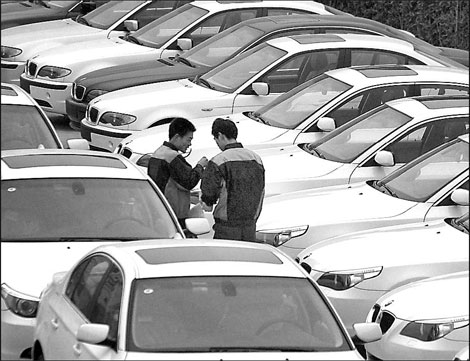


Wang Bin, a 39-year-old Shanghai doctor, plans to buy a bigger car to replace his 4-year-old Volkswagen Santana.
But after the announcement of a hike in Chinese gasoline prices starting from June 20, he'll go for a fuel-efficient model such as a Toyota Camry or a Honda Accord.
"We'll need to pay nearly 100 yuan ($14.55) more at the pump every month," says Wang, browsing a car dealership with his wife and 9-year-old son. "If fuel prices rise further, we might have to go back to a Santana."
China's love affair with the automobile is starting to change as fuel prices rise closer to global levels in the world's second biggest auto market - a change which could temper demand growth in China, which is also the world's No 2 oil consumer.
Growth in sales of big cars, seen as status symbols by the country's burgeoning middle class, may suffer as consumers increasingly shift towards small, fuel-efficient vehicles - and even new technologies such as hybrids.
That could be good news for foreign makers that are already selling smaller cars in China, such as Toyota Motor, Honda Motor and Volkswagen AG.
General Motors and Ford Motor, which have been relying on China to cushion sagging US sales. But they have less of a global reputation among consumers for fuel efficiency.
Shifting consumer demand may also prompt Chinese makers to step up efforts to develop greener cars. Top local players such as SAIC Motor, China's biggest car producer, may have the deep pockets and technical resources to succeed.
"I think we will see the same impact in China that we're seeing in the developed world; people will become more aware of the fuel consumption of vehicles they use," says George Dittmer, analyst at global growth consulting firm Frost & Sullivan.
Rising gasoline prices
China's 17-18 percent hike of nationwide retail prices for gasoline and diesel starting June 20, the first increase in seven months, was the biggest price rise for years.
By itself, the hike is unlikely to have much impact on rocketing growth in total auto sales, analysts believe. At fewer than 60 cars per 1,000 people, auto ownership is still only a tenth of levels seen in the developed world.
But the price hike is widely seen as heralding more rises in coming months or years, as China works toward its declared goals of limiting its rising dependence on energy imports and developing the economy in a cleaner, more energy-efficient way.
And there's plenty of room for Chinese fuel prices to rise further; the hike took gasoline to about 75 US cents a liter, still a quarter cheaper than in the United States and about a third of what British motorists pay.
That makes the recent pattern of growth in Chinese car sales unsustainable over the long run, analysts say.
Overall sales in China rose 22 percent to 6.3 million cars last year, but of that total, sales of sports utility vehicles (SUVs), which tend to use more gasoline, jumped 50 percent to 357,400, according to the main auto industry association.
"Look at what happened in the States," says Huang Zherui, auto analyst at consultancy CSM Worldwide.
"Americans are now abandoning gas-guzzlers like SUVs. Why wouldn't the Chinese, as costs of fuel eventually become unbearable?"
Demand growth for both SUVs and passenger cars has slowed by about a fifth in the first five months of this year.
Wang Mingchun, industry analyst at Tianxiang Consulting in Beijing, estimated the gasoline price hike on June 20 would cost the average Chinese car owner an extra 100 yuan a month, or 5 percent of an ordinary Shanghai resident's disposable income.
That isn't enough to stop many people from buying cars, which cost around 120,000 yuan for small models, but it will prompt buyers to think twice about fuel economy, she says.
Shares tumble
Shares in most Chinese automakers tumbled as advance word of the gasoline price hike spread and investors bet sales of their largest, most profitable models could suffer.
SAIC lost nearly 13 percent during June 16 to 20, underperforming a 1.3 percent fall by the Shanghai market's main index.
But the Hong Kong-listed shares of Chinese auto battery maker BYD Co, which expects to start selling electric hybrid vehicles in China by the end of 2008 and in Europe within three years, outperformed. BYD gained 3.2 percent, against a 0.7 percent rise by the Hang Seng Index.
Analysts speculate that to complement rises in gasoline prices, Chinese industry regulators may soon introduce incentives to jump-start demand for eco-friendly cars that have so far been too expensive for most of the public.
That could benefit sales of Toyota's Prius, the world's best-selling hybrid car.
The firm has sold over 1 million of the cars globally since its debut in 1997, but it moved only 1,000 of them in China last year, or 0.2 percent of Toyota's total sales in the country.
Incentives could also help SAIC's green efforts. Its venture with General Motors launched the Buick LaCrosse Eco-hybrid in China in January, and has said it plans to launch a fuel cell-powered model after 2010.
Agencies
(China Daily 06/30/2008 page4)













